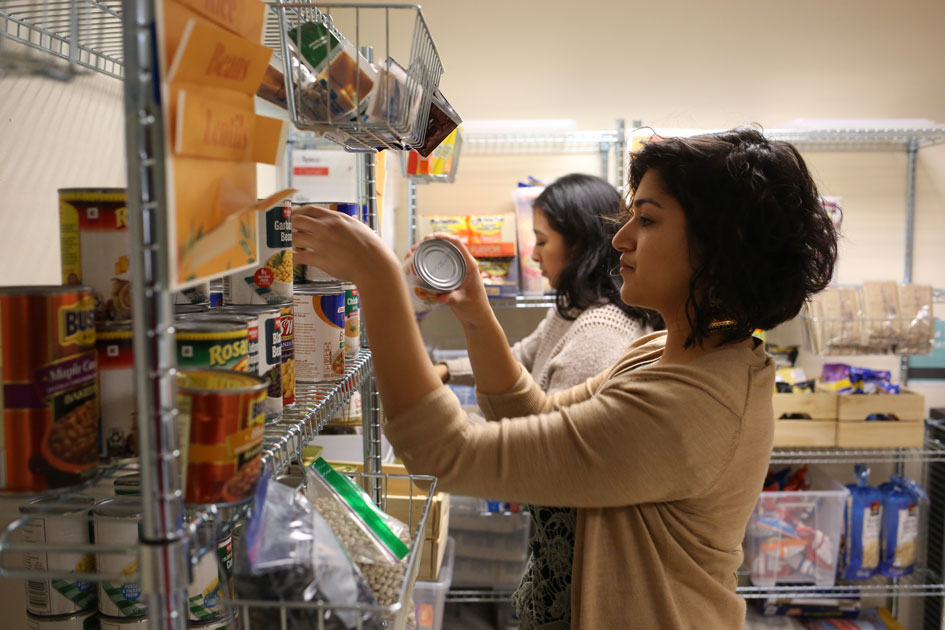Feed Your Head
Community pantry nourishes Reedies on their intellectual odyssey.
Top Ramen. Beans and rice. Scrounging. For decades, thrifty Reed students have applied their ingenuity to the perennial predicament of a rumbling stomach and an empty wallet. Now, they are finally getting some backup from the Reed Community Pantry, which offers food and support to hungry Reedies.
Food insecurity, defined as a lack of reliable access to food, isn’t a new problem. However, in the last three years, there’s been a surge of national attention to the issue in higher education, according to Tara Sonali Miller, program manager for Reed’s SEEDS (Students for Education, Empowerment, and Direct Service). Reed collaborates with 550 other institutions through the College and University Food Bank Alliance (CUFBA).
“It’s not necessarily that food insecurity didn’t exist before,” Miller says. “It’s that more attention is finally being paid to it. There are many different circumstances that could lead to a community member being food insecure. And it’s not isolated to students—alumni and staff have also experienced food insecurity. We’ve moved past having hallway conversations and we’re doing something about it.”
Food Security Initiative
Reed’s Food Security Initiative (FSI) is a multi-layered response that includes a dedicated pantry stocked with food and supplies that is free and open to students, staff, and faculty; a working group of over a dozen students and staff; and an educational campaign about food insecurity. This year, the FSI plans to host workshops on nutrition, cooking, and financial literacy in collaboration with campus partners. A recipe zine is also in the works to answer questions like: What’s in season? How do I store food items so they don’t spoil? Where can I get the foods I like and know how to prepare? How do I cook without water or a sink?
The FSI’s goal is to offer resources that alleviate food insecurity at Reed so that every community member can live, learn, work, teach, and thrive.
“Food is part of how we take care of each other,” Miller says. The pantry offers staples such as pasta, soup, beans, and rice, a fridge of fresh and frozen food, gluten-free and vegan meals, and popular favorites like Flamin’ Hot Cheetos. You can also find snacks, toiletries, clean clothing, books, menstrual products, disposable heat patches, healthy microwaveable meals, spices, shelf-stable juice, and vitamins.
Located in the basement of the Gray Campus Center, the pantry itself is warm and friendly. Students and staff worked together to transform the room into a colorful, cozy space. The stigma around hunger is a huge barrier for many people: it’s one thing to stand in the Scrounge line or joke about scurvy, but acknowledging food insecurity is another story. Creating a place that was inclusive and non-judgmental was critical to building the kind of community where everyone feels welcome.
Hungry For Knowledge
Food insecurity has a venerable, well documented history at Reed. Students in the forties and fifties ate horsemeat. In the sixties, Jay Rosenberg ’62 published the classic Impoverished Students' Book of Cookery, Drinkery, & Housekeepery, a timeless survival manual stuffed with recipes and common-sense suggestions for maintaining domestic order. The institution of scrounging, where students pick through leftovers and share meals in Commons, originated in 1966.
Later, students self-published maps of fruit trees, food boxes, unlocked dumpsters, and community gardens where food was available. Students fortified their cupboards with urban gleaning, dumpster diving, gardening, and food stamps. Much of this knowledge is lost when students graduate, so one of the goals of the Food Security Initiative is to concentrate the collective knowledge of the Reed community in a physical, welcoming space.
Funding for the pantry comes from SEEDS, the Office of Inclusive Community, the Student Senate, and the Social Justice Research and Education Fund. The food comes from WinCo and locally owned grocery stores operated by people of color, such as the Portland Mercado and various Asian markets. The pantry also accepts donations and seeks volunteers to join its mission of building community and keeping Reed students nourished—intellectually and bodily.
Tags: Service, Financial Aid, Campus Life, Institutional
